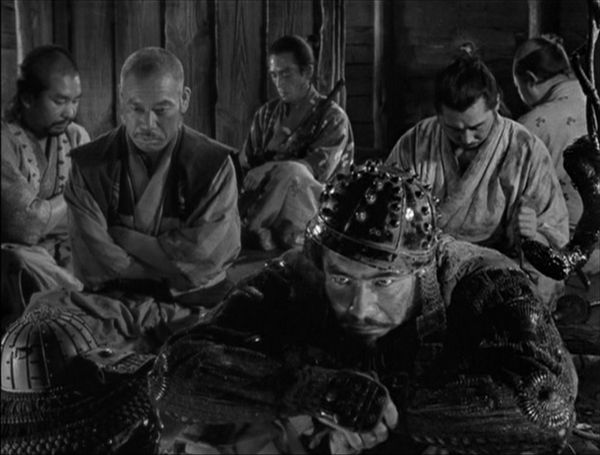SEVEN SAMURAI (Shichinin no samurai)
(director/writer: Akira Kurosawa; screenwriters: Shinobu Hashimoto/Hideo Oguni; cinematographer: Asakazu Nakai; editor: Akira Kurosawa; music: Fumio Hayasaka; cast: Takashi Shimura (Kambei Shimada), Toshirô Mifune (Kikuchiyo), Yoshio Inaba (Gorobei Katayama), Seiji Miyaguchi (Kyuzo), Minoru Chiaki (Heihachi Hayashida), Daisuke Katô (Shichiroji), Isao Kimura (Katsushiro Okamoto), Kuninori Todo (Village Elder), Daisuke Kato (Shichiroji), Minoru Chiaki (Heihachi), Yoshio Tsuchiya (Rikichi); Runtime: 204; MPAA Rating: NR; producer: Sojiro Motoki; Criterion Collection; 1954-Japan-in Japanese with English subtitles)
“Crosses over from raw entertainment to lovable trashy art.”
Reviewed by Dennis Schwartz
From the beating of warlike drums over the opening credits, Akira Kurosawa’s (“Throne of Blood”/”The Hidden Fortress”/”Yojimbo”/”Rashomon”) thrilling black-and-white tale about samurai warriors set in medieval Japan (16th century) takes on the pulse of an American Western. It’s Kurosawa’s best realized film (though some might prefer the more economical Yojimbo or the more thought-provoking Rashomon), with great action and battle scenes (the bloody climactic battle in the rain is a classic), a good sense of detail for the period, and colorful characterizations. The acting is first-rate (in the formal style of Noh and Kabuki), with a memorable Toshirô Mifune portrayal of a self-appointed wannabe half-crazed samurai stealing the pic. It was made by the Toho studio and was the most expensively made Japanese film at the time. Hollywood based the 1960 Western “The Magnificent Seven” on this film.
About forty bandits annually steal the harvest from a village of poor farmers, but this time are persuaded to hold off their raid until after the barley ripens. Unable to fight back, the farmers wail “[They] are born to suffer, that’s our lot in life.” Conflicted about what to do they go for help to their wiseman elder (Kuninori Todo), who tells them to hire “hungry samurai” who will accept food as payment to protect them. With that in mind they hire selfless and noble-hearted swordsman Kambei (Takashi Shimura), after seeing him cunningly rescue a farmer’s daughter from kidnappers. He assumes the role of leader and recruits six more swordsmen to defend the village. The altruistic samurais include the young Katsushiro (Isao Kimura), who Kambei considers to be his disciple; the master swordsman Kyuzo (Seiji Miyaguchi); the fearless Shichiroji (Daisuke Kato); the confident Gorobei (Yoshio Inaba); the good-hearted but only average swordsman Heihachi (Minoru Chiaki); and lastly the arrogant, clownish, loudmouth Kikuchiyo (Toshiro Mifune), who it is later discovered is only posing as a samurai as it’s divulged that he’s the son of a farmer. In battle Kikuchiyo will prove to be courageous.
The samurais make war plans and train the peasants to fight, and counter the raids of the bandits. Against overwhelming odds, the seven samurai prepare for their climactic showdown with the savage bandits (who make their annual raids because they are also hungry).
Kurasawa’s film creatively catches the dangers of living in the medieval times and glorifies the selfless bravery and loyalty of the samurais; it’s a rich period drama that crosses over from raw entertainment to lovable trashy art.

REVIEWED ON 7/14/2006 GRADE: A